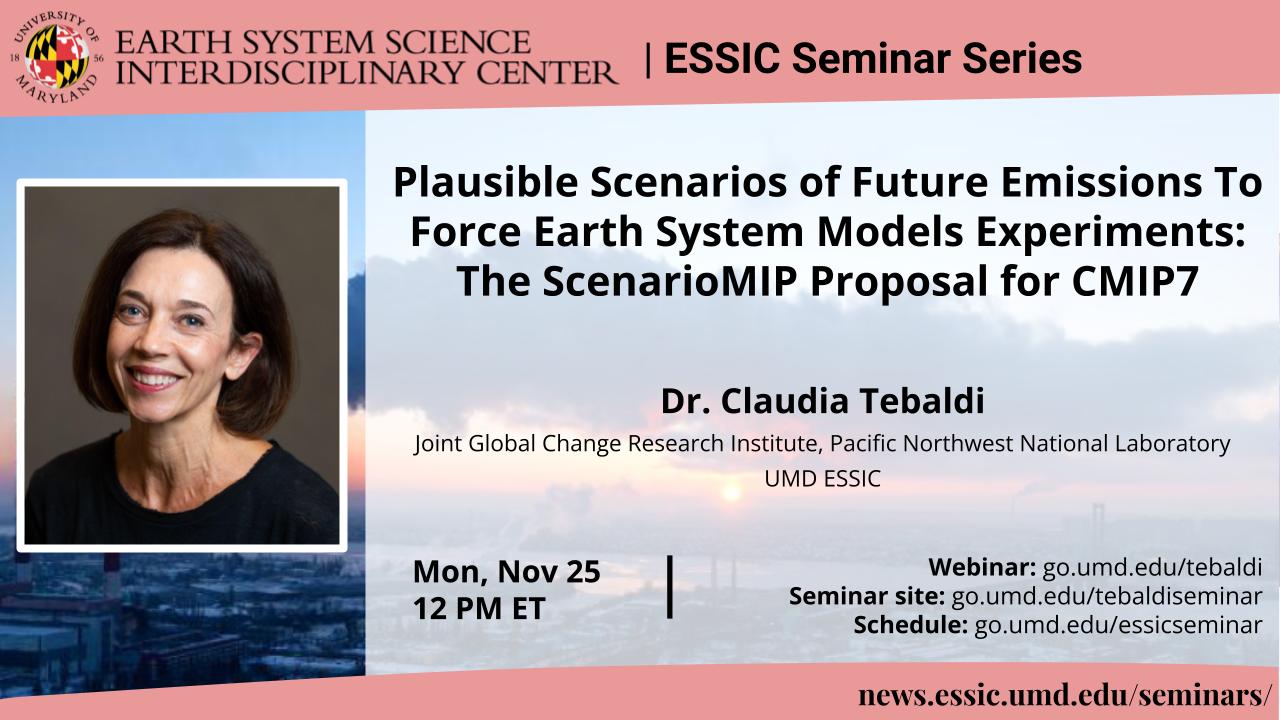
Plausible Scenarios of Future Emissions To Force Earth System Models Experiments: The ScenarioMIP Proposal for CMIP7

Dr. Claudia Tebaldi
Joint Global Change Research Institute
Pacific Northwest National Laboratory
UMD/ESSIC
Monday November 25, 2024, 12 PM ET
(This is a virtual seminar as there is construction project undergoing in the lecture room)
Abstract:
Scenarios represent a critical tool in climate change analysis. Defined as plausible alternative descriptions of how the future may develop based on a coherent set of assumptions, they are used by different research communities to explore potential future avenues in socio-economic conditions, assess the effects of different drivers of climate change, characterize future climatic conditions, and assess impacts of climate change as well as adaptation and mitigation responses.
The World Climate Research Programme’s (WCRP) Coupled Model Intercomparison Project (CMIP) has been organizing the development and use of such scenarios already in several rounds. In the most recent phase 6 (CMIP6), CMIP delegated the organization of experiments targeting specific research areas and questions to the scientific community, and CMIP6- Endorsed Model Intercomparison Projects (MIPs) were established. The Scenario Model Intercomparison Project (ScenarioMIP) formed a primary activity within CMIP6 that facilitated multi-model future climate projections.
In this continuing role, ScenarioMIP’s goal for CMIP7 is the design of a limited set of scenario- based experiments to be run by climate models, with three important aims: science, service and policy. Despite these important roles, ScenarioMIP can only run a limited set of scenarios. Computational expenses associated with setting up, running and archiving output from climate model experiments pose strict constraints on the number of scenarios that ScenarioMIP’s protocol can include.
In this talk I will describe the current proposal for ScenarioMIP’s CMIP7 protocol: six scenarios spanning a wide range of radiative forcings and mitigation choices (or lack thereof), each with at least one extension beyond 2100 and out to 2500 to address the need of research into slow processes like sea level rise, and (ir)reversibility of climate changes. The talk will focus on the rationale of each individual scenario and the set as a whole. Many issues familiar to the physical climate research community will be touched upon, like choices about emission- vs. concentration-driven experiments, the representation of carbon dioxide removal measures in ESM with an active carbon cycle, the role of regional vs. global (well-mixed) forcings, signal vs. noise, ensemble size. Other types of issues, perhaps less familiar to physical scientists, have also emerged and will be described, like the meaning of feasibility/plausibility when judging an emission scenario, and the role of justice considerations in relation to the burden of mitigation required by the different warming targets, and how that would be distributed around the world and over time when designing an emission pathway.
Biosketch:
Claudia Tebaldi is a statistician by training and her work has centered around uncertainty characterization in future projections of anthropogenic climate change, with focus on changes at the regional scale, particularly in extremes. She has also worked on observation-based detection and attribution studies, to characterize the causes of observed climatic changes. In the last decade her work has shifted increasingly to connecting the physical changes in the climate system to impact studies and risk assessment.
Dr. Tebaldi was a staff scientist at the National Center for Atmospheric Research (NCAR), and Climate Central Inc. and joined the Joint Global Change Research Institute, a division of the Pacific Northwest National Laboratory affiliated to University of Maryland in 2019. She has a joint appointment with University of Maryland, as a research scientist in the Earth System Science Interdisciplinary Center.
Dr. Tebaldi has worked as an author on the last three Assessments of the Intergovernmental Panel on Climate Change (IPCC), as part of Working Group I, on the physical science basis. She was an author of the 5th US National Climate Assessment (NCA5), recently released. She co-chairs ScenarioMIP, which organizes the coordinated scenario simulations by the world’s climate modeling centers. She maintains an affiliation to Climate Central, a non-profit, non-advocacy science-communication organization dedicated to educating the US public to the impacts of climate change and its solutions.
Dr. Tebaldi is an elected fellow of the American Geophysical Union.
Virtual Only:
Event site: https://go.umd.edu/tebaldi
Zoom Webinar: https://go.umd.edu/tebaldiwebinar
Zoom Meeting ID: 959 2268 7165
Zoom password: essic
US Toll: +13017158592
Global call-in numbers: https://umd.zoom.us/u/aMElEpvNu
For IT assistance:
Cazzy Medley: cazzy@umd.edu
Resources:
Seminar schedule & archive: https://go.umd.edu/essicseminar
Seminar Google calendar: https://go.umd.edu/essicseminarcalendar
Seminar recordings on Youtube: https://www.youtube.com/user/ESSICUMD
